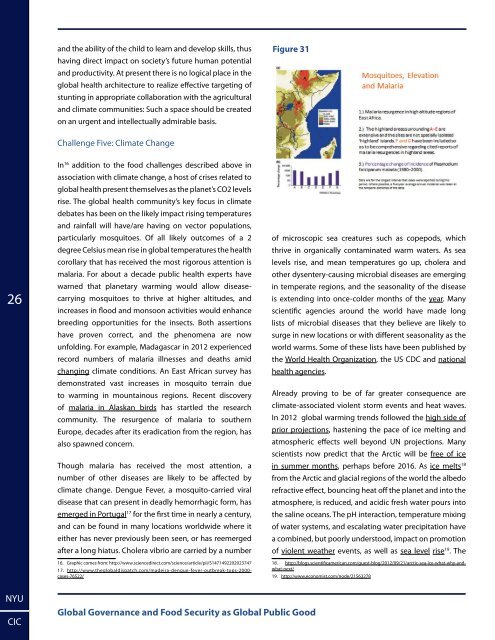Existential Challenges to Global Health - Center on International ...
Existential Challenges to Global Health - Center on International ...
Existential Challenges to Global Health - Center on International ...
You also want an ePaper? Increase the reach of your titles
YUMPU automatically turns print PDFs into web optimized ePapers that Google loves.
and the ability of the child <str<strong>on</strong>g>to</str<strong>on</strong>g> learn and develop skills, thus<br />
having direct impact <strong>on</strong> society’s future human potential<br />
and productivity. At present there is no logical place in the<br />
global health architecture <str<strong>on</strong>g>to</str<strong>on</strong>g> realize effective targeting of<br />
stunting in appropriate collaborati<strong>on</strong> with the agricultural<br />
and climate communities: Such a space should be created<br />
<strong>on</strong> an urgent and intellectually admirable basis.<br />
Figure 31<br />
Challenge Five: Climate Change<br />
26<br />
In 16 additi<strong>on</strong> <str<strong>on</strong>g>to</str<strong>on</strong>g> the food challenges described above in<br />
associati<strong>on</strong> with climate change, a host of crises related <str<strong>on</strong>g>to</str<strong>on</strong>g><br />
global health present themselves as the planet’s CO2 levels<br />
rise. The global health community’s key focus in climate<br />
debates has been <strong>on</strong> the likely impact rising temperatures<br />
and rainfall will have/are having <strong>on</strong> vec<str<strong>on</strong>g>to</str<strong>on</strong>g>r populati<strong>on</strong>s,<br />
particularly mosqui<str<strong>on</strong>g>to</str<strong>on</strong>g>es. Of all likely outcomes of a 2<br />
degree Celsius mean rise in global temperatures the health<br />
corollary that has received the most rigorous attenti<strong>on</strong> is<br />
malaria. For about a decade public health experts have<br />
warned that planetary warming would allow diseasecarrying<br />
mosqui<str<strong>on</strong>g>to</str<strong>on</strong>g>es <str<strong>on</strong>g>to</str<strong>on</strong>g> thrive at higher altitudes, and<br />
increases in flood and m<strong>on</strong>so<strong>on</strong> activities would enhance<br />
breeding opportunities for the insects. Both asserti<strong>on</strong>s<br />
have proven correct, and the phenomena are now<br />
unfolding. For example, Madagascar in 2012 experienced<br />
record numbers of malaria illnesses and deaths amid<br />
changing climate c<strong>on</strong>diti<strong>on</strong>s. An East African survey has<br />
dem<strong>on</strong>strated vast increases in mosqui<str<strong>on</strong>g>to</str<strong>on</strong>g> terrain due<br />
<str<strong>on</strong>g>to</str<strong>on</strong>g> warming in mountainous regi<strong>on</strong>s. Recent discovery<br />
of malaria in Alaskan birds has startled the research<br />
community. The resurgence of malaria <str<strong>on</strong>g>to</str<strong>on</strong>g> southern<br />
Europe, decades after its eradicati<strong>on</strong> from the regi<strong>on</strong>, has<br />
also spawned c<strong>on</strong>cern.<br />
Though malaria has received the most attenti<strong>on</strong>, a<br />
number of other diseases are likely <str<strong>on</strong>g>to</str<strong>on</strong>g> be affected by<br />
climate change. Dengue Fever, a mosqui<str<strong>on</strong>g>to</str<strong>on</strong>g>-carried viral<br />
disease that can present in deadly hemorrhagic form, has<br />
emerged in Portugal 17 for the first time in nearly a century,<br />
and can be found in many locati<strong>on</strong>s worldwide where it<br />
either has never previously been seen, or has reemerged<br />
after a l<strong>on</strong>g hiatus. Cholera vibrio are carried by a number<br />
16. Graphic comes from: http://www.sciencedirect.com/science/article/pii/S1471492202023747<br />
17. http://www.theglobaldispatch.com/madeira-dengue-fever-outbreak-<str<strong>on</strong>g>to</str<strong>on</strong>g>ps-2000-<br />
cases-76522/<br />
of microscopic sea creatures such as copepods, which<br />
thrive in organically c<strong>on</strong>taminated warm waters. As sea<br />
levels rise, and mean temperatures go up, cholera and<br />
other dysentery-causing microbial diseases are emerging<br />
in temperate regi<strong>on</strong>s, and the seas<strong>on</strong>ality of the disease<br />
is extending in<str<strong>on</strong>g>to</str<strong>on</strong>g> <strong>on</strong>ce-colder m<strong>on</strong>ths of the year. Many<br />
scientific agencies around the world have made l<strong>on</strong>g<br />
lists of microbial diseases that they believe are likely <str<strong>on</strong>g>to</str<strong>on</strong>g><br />
surge in new locati<strong>on</strong>s or with different seas<strong>on</strong>ality as the<br />
world warms. Some of these lists have been published by<br />
the World <str<strong>on</strong>g>Health</str<strong>on</strong>g> Organizati<strong>on</strong>, the US CDC and nati<strong>on</strong>al<br />
health agencies.<br />
Already proving <str<strong>on</strong>g>to</str<strong>on</strong>g> be of far greater c<strong>on</strong>sequence are<br />
climate-associated violent s<str<strong>on</strong>g>to</str<strong>on</strong>g>rm events and heat waves.<br />
In 2012 global warming trends followed the high side of<br />
prior projecti<strong>on</strong>s, hastening the pace of ice melting and<br />
atmospheric effects well bey<strong>on</strong>d UN projecti<strong>on</strong>s. Many<br />
scientists now predict that the Arctic will be free of ice<br />
in summer m<strong>on</strong>ths, perhaps before 2016. As ice melts 18<br />
from the Arctic and glacial regi<strong>on</strong>s of the world the albedo<br />
refractive effect, bouncing heat off the planet and in<str<strong>on</strong>g>to</str<strong>on</strong>g> the<br />
atmosphere, is reduced, and acidic fresh water pours in<str<strong>on</strong>g>to</str<strong>on</strong>g><br />
the saline oceans. The pH interacti<strong>on</strong>, temperature mixing<br />
of water systems, and escalating water precipitati<strong>on</strong> have<br />
a combined, but poorly unders<str<strong>on</strong>g>to</str<strong>on</strong>g>od, impact <strong>on</strong> promoti<strong>on</strong><br />
of violent weather events, as well as sea level rise 19 . The<br />
18. http://blogs.scientificamerican.com/guest-blog/2012/09/21/arctic-sea-ice-what-why-andwhat-next/<br />
19. http://www.ec<strong>on</strong>omist.com/node/21563278<br />
NYU<br />
CIC<br />
<str<strong>on</strong>g>Global</str<strong>on</strong>g> Governance and Food Security as <str<strong>on</strong>g>Global</str<strong>on</strong>g> Public Good
















